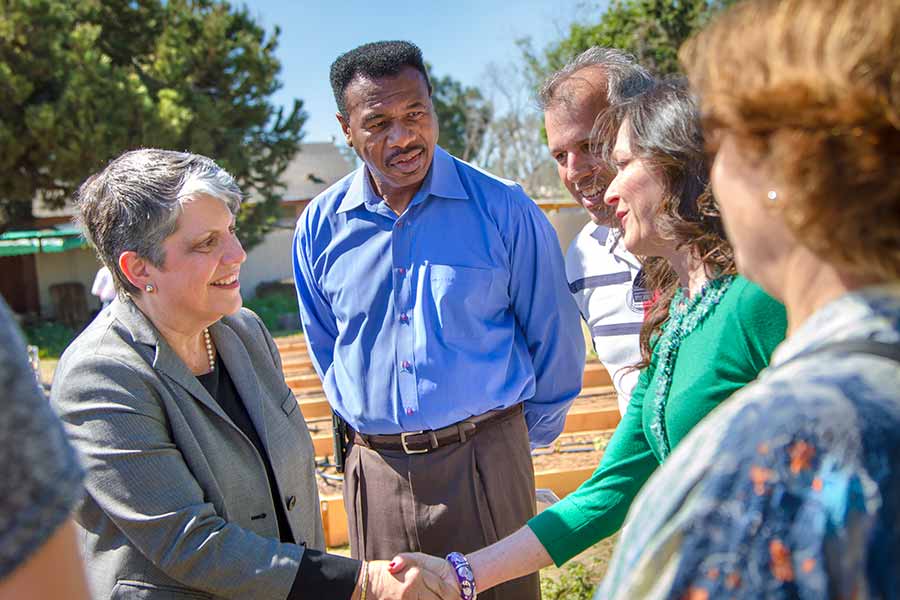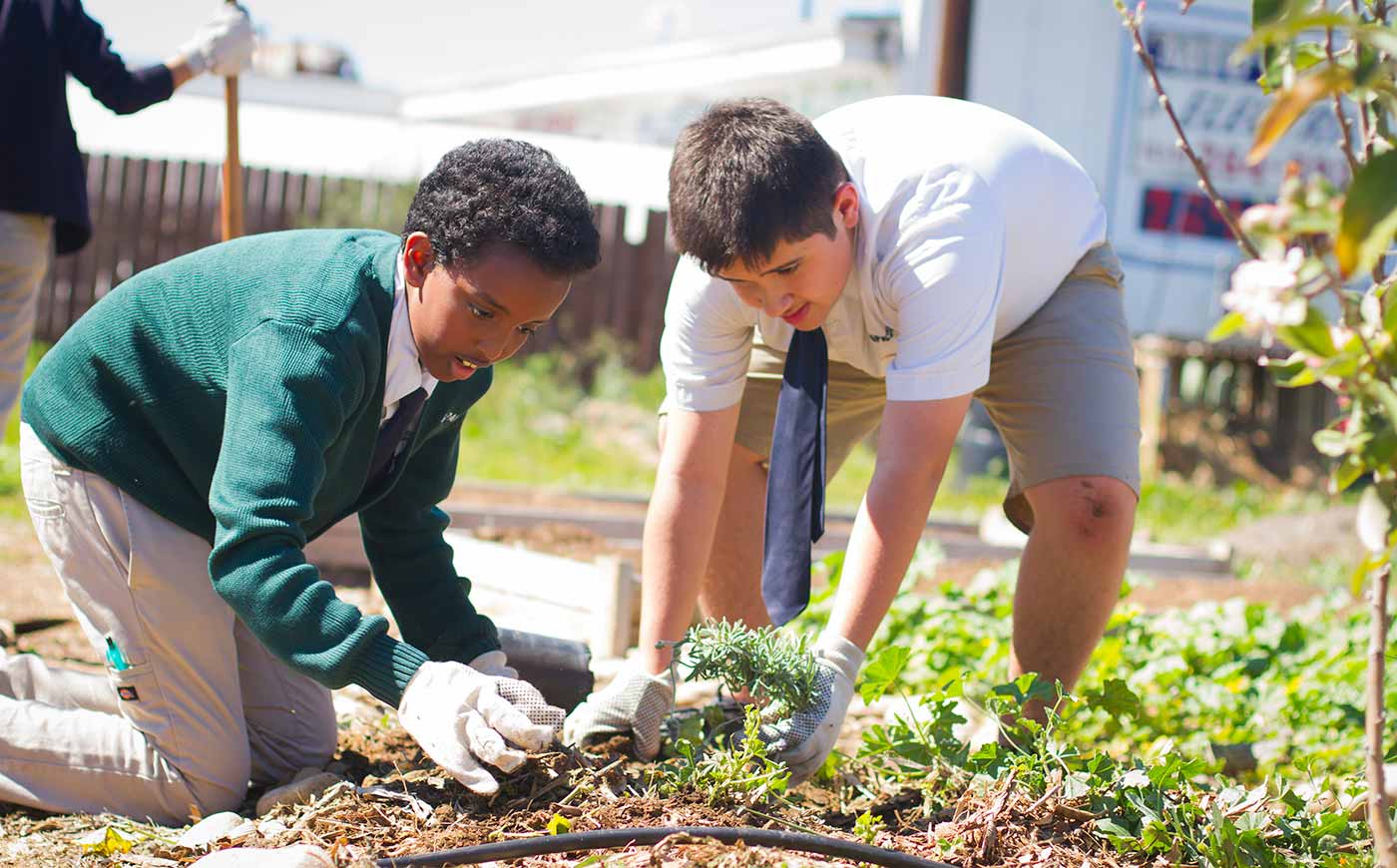
By:
- Laura Margoni
Published Date
By:
- Laura Margoni
Share This:

University of California President Janet Napolitano and UC San Diego Chancellor Pradeep K. Khosla listen as volunteer Karemah Alhark talks about the Ocean View Growing Grounds. Photos by Erika Johnson/University Communications
UC President Janet Napolitano Visits UC San Diego Global Food Initiative Project
It was an unseasonably warm winter day when University of California President Janet Napolitano paid a visit to the Ocean View Growing Grounds in Southeastern San Diego on March 12. Joined by UC San Diego Chancellor Pradeep K. Khosla, UC San Diego students, faculty and community members, Napolitano toured the formerly vacant lot, which is now a thriving community garden thanks to a partnership between the local community and UC San Diego.
“The UC Global Food Initiative’s overall goal is to harness the resources of the University of California—its research, people, expertise and tradition of public service—to put the world on a path to sustainably and nutritiously feed itself,” Napolitano said. “What’s happening here at the Ocean View Growing Grounds is doing just that.”
The 20,000-square-foot garden is located in the Mountain View neighborhood where poverty, obesity and environmental degradation pose serious social and environmental public health problems. Compounding these problems is the fact that the majority of residents living in the area lack access to fresh fruits and vegetables. Neighbors are partnering with nonprofit organizations, UC San Diego researchers and students to address these problems in solutions-oriented ways.

Napolitano meets with several community members involved with the site.
Keith Pezzoli, director of the urban studies and planning program at UC San Diego and a faculty member in the department of communication, is an active participant at the Ocean View Growing Grounds. Pezzoli is working with a team of civically engaged scientists on an Urban Agriculture and Food Disparities research project. This project includes supporting the cultivation of community gardens and food forests—which mimic woodland ecosystems—on vacant lots, beginning with the Ocean View site.
The Urban Agriculture and Food Disparities research project is part of the UC Global Food Initiative (#globalfood). The research agenda is to critically analyze and evaluate urban agriculture (including community gardens, urban farms, food forests, aquaculture and animal husbandry) in low-income and underserved neighborhoods. The plan is to establish a comparative multi-campus research program within the UC system dedicated to critically examining urban agriculture’s potential to increase food security and food justice.
“What’s being done here is much more than planting healthy food,” said Pezzoli. “The Ocean View site is becoming a trusted place where neighbors learn to grow food safely, engage youth and participate in sustainability science and community planning.”
A $210,400 grant from the UC Global Food Initiative will help advance the work being done at the site.
As part of the Ocean View project, undergraduate and graduate UC San Diego students provide plant and soil testing technologies, mapping, visualization, site assessment and scenario planning tools.
During her visit, Napolitano spoke with some of these students, four of whom were also recently awarded UC Global Food Initiative Fellowships. The $2,500 fellowships were awarded to undergraduate and graduate students at all 10 UC campuses plus the UC Division of Agriculture and Natural Resources and Lawrence Berkeley National Laboratory. The students are selected by their campuses and the awards fund student-generated research, related projects or internships that focus on food issues.
Danielle Ramirez, a fourth year student majoring in urban studies and planning, discussed the focus of her Global Food fellowship project with Napolitano, explaining how her research examines the role of youth in community development with a focus on urban agriculture.

Middle school students from Gompers Preparatory Academy plant seedlings and learn about fresh fruits and vegetables during their visit to the garden.
“We’re looking for ways to empower the community,” she said. “To take the scientific knowledge available and make it accessible so everyone can benefit.”
The three other UC San Diego fellows each had a chance to share their research with Napolitano. They included:
- Jancy Benavides: A fourth year student studying public health, Benavides’s research examines community-based efforts to turn brownfields—potentially contaminated vacant land—into productive spaces for growing healthy food. Her research documents how risk communication takes place at such sites where multiple stressors, such as pollution, poverty and obesity, cause cumulative impacts on health.
- Jane Kang: A third year student majoring in urban studies and planning, Kang’s study examines community participation in the design and management of a food forest and composting facility.
- Hayden Galante: A fourth year student majoring in political science, Galante is studying efforts to promote green infrastructure and sustainable landscape practices as a way of improving the quality and management of localized food production and water systems.
While Napolitano spoke with students and community members, local middle school students from nearby Gompers Preparatory Academy were in the garden learning about different types of vegetables and planting seeds.
“Processed food can sometimes have bad chemicals,” said Gompers student Angel Lara. “Here, if we plant vegetables and fruits we can eat the fresh fruits and vegetables.”
The University of California Global Food Initiative aims to put the world on a path to sustainably and nutritiously feed itself. By building on existing efforts and creating new collaborations among UC’s 10 campuses, affiliated national laboratories and the Division of Agriculture and Natural Resources, the initiative will develop and export solutions for food security, health and sustainability throughout California, the United States and the world.
Share This:
You May Also Like
Stay in the Know
Keep up with all the latest from UC San Diego. Subscribe to the newsletter today.


